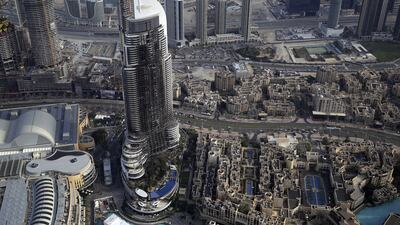DUBAI // Enforcement is necessary to compel companies in the building industry to comply with the UAE’s new Fire and Life Safety Code, experts say.
The code requires the use of third-party independent inspections, strict accountability and fines. It was announced at the Intersec safety and security conference on Sunday, although specific technical details were not available.
Industry members said they would have to wait a few days to obtain the code and understand its implications before sharing it with their colleagues and clients, and applying it to projects.
“What we have heard from previous discussions with the Civil Defence is that the process from design to commissioning right at the end will be far more closely scrutinised and formalised,” said Andy Dean, head of facades at WSP Parsons Brinckerhoff, an engineering and design consultancy.
He said companies would have to sign a document to affirm that they would comply with the code’s requirements.
“All parties during the whole process will have to be far more accountable. That is a general change but it’s an important change,” said Mr Dean.
“The success of that will depend on the enforcement. A law is only a law if it’s enforced and we really hope that some of these changes are backed up with real actions.”
Changes were also anticipated on smoke control, with more information on glass safety.
“Based on what was said, the code is very much about the clarification of a lot of the existing information,” Mr Dean said.
Third-party independent inspections would be an integral part of the compliance process, experts said.
Civil Defence officials said the code would include fines of up to Dh50,000 for each fault uncovered by inspectors, but experts said the fines should be more severe.
“There should be serious fines not in the thousands or hundreds of thousands of dirhams, but in millions, because when a company takes on a project that is worth tens of millions of dirhams, a fine of Dh100,000 is peanuts,” said David O’Riley, managing partner of fire safety consultancy Britannia International.
“But a fine of Dh10 million will make sure that they will put it right and make sure that they always get it right. This goes back to the need for enforcement.
“Fire safety shouldn’t be an option. The regulation must be enforced.”
Authorities tried to phase out combustible cladding in new buildings with the Federal 2012 Fire and Life Safety Code, but concerns persist about buildings completed before 2012.
Civil Defence officials said the code was meant to reduce the likelihood of fire breaking out at new buildings by introducing new regulations, procedures, regular maintenance and inspections.
Maj Gen Rashid Al Matroushi, director general of Dubai Civil Defence, said last week that the code would be regularly updated to keep abreast of safety standards.
“The updated chapters include those related to fire doors, cladding in buildings, access for Civil Defence trucks to reduce incident response times, and educating consultants, contractors and end-users on the latest modifications,” he said.
rtalwar@thenational.ae


